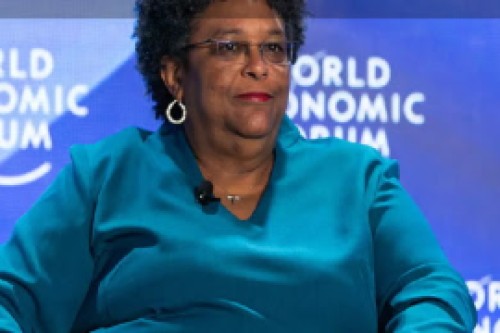Prime Minister Mia Mottley Says Addressing the Climate Crisis Requires Both Public and Private Investments
TIANJIN, China – Barbados Prime Minister Mia Mottley has urged governments and private sector leaders to take immediate action on addressing climate change.
 Barbados Prime Minister Mia Mottley participating in panel at Annual Meeting of the New Champions in China (World Economic Forum photo)Addressing the 14th Annual Meeting of the New Champions as part of a panel on ‘Braving the Headwinds: Rewiring Growth Amid Fragility’, she said “I think we are all agreed that first and foremost, the world is facing a climate crisis”.
Barbados Prime Minister Mia Mottley participating in panel at Annual Meeting of the New Champions in China (World Economic Forum photo)Addressing the 14th Annual Meeting of the New Champions as part of a panel on ‘Braving the Headwinds: Rewiring Growth Amid Fragility’, she said “I think we are all agreed that first and foremost, the world is facing a climate crisis”.
The Annual Meeting of the New Champions brings together the world’s top academics, politicians, business, youth, and civil society leaders to engage in addressing the most pressing issues on the global agenda.
Mottley said Barbados is one of the Caribbean’s most vulnerable nations to climate change and that in recent years, the island has endured major and more frequent hurricanes alongside rising sea levels, leading to coastal erosion and major flooding.
Mottley said addressing the climate crisis requires both public and private investments. In particular, the private sector is suited to advance mitigation and adaptation strategies, she said.
“The public sector will focus on adaptation and being able to make the country and the people more resilient. At the same time, that is going to mean investments within the country by the private sector themselves.
“Let’s take hotels that are on beaches. If the coastal erosion is bad, their revenue is going to be compromised. So there are some instances where the private sector will benefit from increased savings or avert loss of revenue with respect to adaptation. But mitigation is where the private sector truly can drive the activities,” Mottley said.
She said that facilitating flows of capital which she described as the “oxygen” needed for climate action between developed and developing countries is critical.
In 2022, Barbados released a plan to reform the way wealthier countries finance poorer countries in a climate crisis. The Bridgetown Initiative , named after the island’s capital city, calls for emergency liquidity to mitigate the debt crisis faced by many countries and expand multilateral lending by $1 trillion.
The project has been compared to the Marshall Plan, the 1948 US aid program that provided more than $13 billion of foreign aid to help Western Europe recover after World War II.
“The problem is that there is a serious disparity in the pricing of capital between the global north and the global south,” Mottley told the panel discussions, adding “We therefore have to start where we can make meaningful progress and we believe that is in the area of finance”.
Mottley is at the forefront of the global fight for this money and jointly hosted the Summit for a New Global Financing Pact in Paris last week.
In Tianjin, she added that private-sector funding is also key, stating that an estimated US$1.5 trillion would likely be needed.
But Mottley pointed to the “serious disparity” between the pricing of capital between the global north and south, saying it was time to start making meaningful progress in financing mitigation strategies.
“The reality is that while we focus on the increased capital for the multilateral development banks and the regional development banks to help governments with adaptation, it is that private sector unlocking of funding that is going to help mitigate and to keep temperatures below 1.5 [degrees Celsius].
“I do believe that it may require some countries stepping forward and not only putting in liquid cash; in some instances, it will be SDRs [Special Drawing Rights]. We probably need a governance mechanism that anchors this trust or catalytic fund in the International Monetary Fund and the World Bank because that then means that those countries that want to use SDRs won’t have that as a liability on their balance sheet,” she said.
She insisted that the world cannot take another crisis at this point, warning that decoupling the climate crisis agenda would present that risk.
“Regrettably, it will carry certain countries over the edge…. In developing countries, the level of decline will be significantly worse than what you’re seeing. At the same time, the opportunities that are there for us to be able to have strong activity as we prepare for making ourselves more resilient are patent,” she said, urging countries to develop a conscience and to work together cooperatively.


